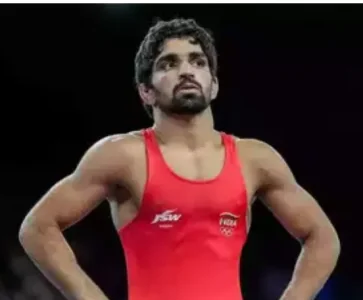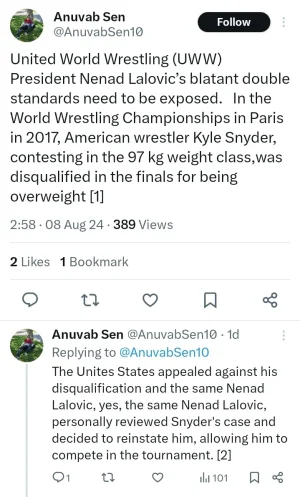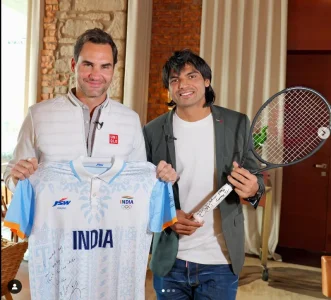- Joined
- Jul 1, 2024
- Messages
- 1,896
- Likes
- 10,153
Very informative.. straight from the horse's mouth.

 www.republicworld.com
www.republicworld.com

Paris Olympics 2024: Chief Nutritionist of Indian Contingent Emphasizes Athletes' Dietary Regimen
In the wake of Paris Olympics republicworld.com caught up with the Chief Nutritionist of Indian Contingent at the Paris Olympics, Ms. Aradhana Sharma.
Q. What are some common nutritional challenges athletes face during the Olympics, and how do you address them?
Common nutritional challenge! A couple of things. Once when they travel to a new time zone, they have to adjust to sleep and their digestive system, their whole body process has to adjust according to the time, so that is one thing. For that challenge, what we generally tell, I tell the athletes before going to the new location and or in Paris in three, three and a half hour difference, so we ask them to shift their meal time here in India by at least one hour, so when they are there it will not be huge, now if they are travelling from India to totally to the US, where there is a gap 10-11 hours, then again we have to see. So, small-small changes we start making before they travel. That's one challenge, second challenge is, a lot of our athletes are vegetarian, the third is they are very used to homemade food, the Dal Chawal, Roti Rajma, Sabzi, etc.
Q. Being a vegetarian or a non-vegetarian, does it make any
It does not, it's only that if you are vegetarian, we need to vey closely plan your diet and you have to follow it really well. So, it does not matter if a vegetarian or vegan as long as they have a plan in hand. They get almost all the nutrients to their vegetarian diet also. So, that is but that's a challenge for some of the Indian athletes, luckily many of them are not vegetarian but some of them are. Now the good part here in Paris is that they have sustainable, green food and lot of vegetarian and vegan options are available this year for the athletes in their Olympic village menu. So, we won't face so much of that challenge. But there are atheletes who are so used to having rice and chapati, and all that, that we won't be getting there every day. There are certain Indian dishes in the Olympic menu, it's not like every day. So, for that this challenge that why it is always always recommended to prepare yourself beforehand, that if tour familiar food is not available you should be able to eat a different kind of food.
Q. What are the main nutritional goals for the athletes leading up to the Olympics?
We have different sports but the nutritional basics are the same because we all need energy to work. So, the basics are the same but then there are certain power sports you would need to ensure that your protein intake is right there. For the endurance sport, you will have to make sure you are loaded with carbohydrates, at least your carbohydrate intake is good. Similarly, we have skill sports like archery and shooting, which don't need a lot of calories but they need nutrient-dense food. So, the quantity of food, what time they are eating, and what food they are eating. So, it is what, when and how much, that depends on different sports disciplines and according to their energy requirements, their event timings and how much they have been training. Some may train for two hours, some may train for one hour, so depending on that the nutritional goals differ for each athlete and especially when they are into weight-specific sport because some of them would be trying to maintain the weight some of them have to gain a little or loose a little, so based on their requirement, we do tweak here and there.
Q. How do you tailor nutritional plans for athletes in different sports?
We have to take the basic data in account- Age, Height, Weight. Then there is training timing. As I said, some may train once, some may train twice, then another thing that comes in is their body composition, we need to know what is the muscle mass in their body and what is the fat mass. The lean mass and fat mass. So, based on that we decide the tergets for different athletes and according to that then we change the percentage of carbohydrate protein and fat in their diet, and of course, we take care of micro-nutrients as well. So, depending on all this, the basic information, age height, weight, gender, training time, where they are training, and how much they are sweating because hydration also we need to take care of, and their fitness as well as the body weight goal. Based on that we modify the diet for each athlete.
Common nutritional challenge! A couple of things. Once when they travel to a new time zone, they have to adjust to sleep and their digestive system, their whole body process has to adjust according to the time, so that is one thing. For that challenge, what we generally tell, I tell the athletes before going to the new location and or in Paris in three, three and a half hour difference, so we ask them to shift their meal time here in India by at least one hour, so when they are there it will not be huge, now if they are travelling from India to totally to the US, where there is a gap 10-11 hours, then again we have to see. So, small-small changes we start making before they travel. That's one challenge, second challenge is, a lot of our athletes are vegetarian, the third is they are very used to homemade food, the Dal Chawal, Roti Rajma, Sabzi, etc.
Q. Being a vegetarian or a non-vegetarian, does it make any
It does not, it's only that if you are vegetarian, we need to vey closely plan your diet and you have to follow it really well. So, it does not matter if a vegetarian or vegan as long as they have a plan in hand. They get almost all the nutrients to their vegetarian diet also. So, that is but that's a challenge for some of the Indian athletes, luckily many of them are not vegetarian but some of them are. Now the good part here in Paris is that they have sustainable, green food and lot of vegetarian and vegan options are available this year for the athletes in their Olympic village menu. So, we won't face so much of that challenge. But there are atheletes who are so used to having rice and chapati, and all that, that we won't be getting there every day. There are certain Indian dishes in the Olympic menu, it's not like every day. So, for that this challenge that why it is always always recommended to prepare yourself beforehand, that if tour familiar food is not available you should be able to eat a different kind of food.
Q. What are the main nutritional goals for the athletes leading up to the Olympics?
We have different sports but the nutritional basics are the same because we all need energy to work. So, the basics are the same but then there are certain power sports you would need to ensure that your protein intake is right there. For the endurance sport, you will have to make sure you are loaded with carbohydrates, at least your carbohydrate intake is good. Similarly, we have skill sports like archery and shooting, which don't need a lot of calories but they need nutrient-dense food. So, the quantity of food, what time they are eating, and what food they are eating. So, it is what, when and how much, that depends on different sports disciplines and according to their energy requirements, their event timings and how much they have been training. Some may train for two hours, some may train for one hour, so depending on that the nutritional goals differ for each athlete and especially when they are into weight-specific sport because some of them would be trying to maintain the weight some of them have to gain a little or loose a little, so based on their requirement, we do tweak here and there.
Q. How do you tailor nutritional plans for athletes in different sports?
We have to take the basic data in account- Age, Height, Weight. Then there is training timing. As I said, some may train once, some may train twice, then another thing that comes in is their body composition, we need to know what is the muscle mass in their body and what is the fat mass. The lean mass and fat mass. So, based on that we decide the tergets for different athletes and according to that then we change the percentage of carbohydrate protein and fat in their diet, and of course, we take care of micro-nutrients as well. So, depending on all this, the basic information, age height, weight, gender, training time, where they are training, and how much they are sweating because hydration also we need to take care of, and their fitness as well as the body weight goal. Based on that we modify the diet for each athlete.






